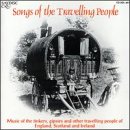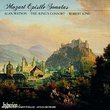| All Artists: Peter Kennedy Title: Songs of Travelling People Members Wishing: 1 Total Copies: 0 Label: Saydisc Original Release Date: 1/1/2006 Re-Release Date: 12/12/1995 Album Type: Import Genres: Folk, International Music, Pop Styles: British & Celtic Folk, Europe, Britain & Ireland, Continental Europe Number of Discs: 1 SwapaCD Credits: 1 UPCs: 789368073825, 5013133440723 |
Search - Peter Kennedy :: Songs of Travelling People
 | Peter Kennedy Songs of Travelling People Genres: Folk, International Music, Pop
|
Larger Image |
CD DetailsSimilar CDs |
CD ReviewsAs if in amber, sounds suspended from the vanished past John L Murphy | Los Angeles | 09/12/2006 (4 out of 5 stars) "I thought this better have a more coherent review than that done by the first person to post one here. Saydisc reissues on CD these songs recorded by Peter Kennedy 1951-68, of those largely "wagon-schooled," i.e., mainly illiterate but for that all the more "cultured and disciplined, with highly developed skills of instinct, adaptability and memory." Therefore, as Kennedy explains in the liner notes, ancient ballads and otherwise lost country songs have been preserved up to the time that they could be put on tape by collectors, and probably given "progress" and assimilation into the wider culture that swamps or swirls pools of outlying practices and traditions, just in time as well.
I had heard of the Irish fiddler Johnny Doran and the singer Margaret Barry, but the others were new to me when I heard them. Outstanding of all on this disc is Pheobe Smith, "queen among the English gipsy singers of South East England" from the Scamp family who lived among the hop-pickers who predated the machines in Kent as these people would travel about as migrant workers for the harvests. Kennedy had discovered her at Melton near his parents' home in Woodbridge, Suffolk, and the songs from 1954 "I am a Romanie" and "Higher Germanie" show her assertive, emotive, and honest delivery of these ballads. Her songs (most of all, the latter two placed dead center as tracks 13 and 15) prove the highlight for me of this well-sequenced disc. From 1958 a song made at least to me familiar by Steeleye Span, who recorded two versions of it for their first two lineups on their first two LPs, "A Blacksmith Courted Me," appears on track 8 in a powerful version. For those who have heard this tune wrapped in electric or acoustic instruments, it's a treat to have it presented raw and a capella. The rest of the entries vary a bit of "mouth music," some simple melodies on accordion, fiddle, guitar, harmonica, and, for Barry, banjo. These tend to be sparse sounding, brief, and very much of the live moment they were played, no studio gloss. What is not explained here is why songs tend to be vocal or instrumental but without as much blending of the two as is usual for those hearing traditional or folk music as is generally the case in the 20c. Does this dichotomy symbolize an intended separation of voice from playing more prominent than in most British folk music? Also, the notes do not elaborate on a notable feature: often the instrumental and the vocal, while they may appear as the same track, follow one another but again rarely blend together, as if musicians put all of their effort into the voice and the playing each on its own without the distraction of simultaneously other form of accompaniment. I'm no musicologist, but this feature did serve to make more prominent a distinguishing element on this CD. The other songs all have their moments, and there's probably not a weak track out of the 26. While the absence of Welsh travellers or Roma (alongside the English, Irish, and Scots ones here) is to be regretted, what is gathered here by Kennedy is quite a feat of historical reclamation. It's 76 generous minutes of a sonic glimpse into a realm that with plastics--in more ways than one--has changed the lives of those who continue on the roads today beyond recognition of those who, a couple generations ago, played and sang as Kennedy rolled the spools. It makes for a rather intense immersion; these are "field recordings" that serve as an aural documentary and not to provide (as may have been their original milieu of course) light entertainment. I wish the notes had placed them in context: I wondered which might have been sung for non-travellers, say at fairs or on the streets for money. The opening track by the last of the London sellers, a lavender merchant, Janet Penfold of Battersea, provides one such example, but surely others of the 25 other songs may have also been targeted for the wider public? On the other hand, many songs here are insular, for "in-house consumption" only, as it were. Towards the end of the record, more verses employing "cant"-- the argot used to disguise conversations from meddlesome outsiders-- appear, and these rarely have been archived on tapes for the general public rather than scholars to hear. As one who has in my family tree Irish travellers, this album intrigues me and also offers an epitaph for a sub-culture that has now faded into other forms, still identifiably non-settled, but with no longer horse caravans parked beside the open roads of Ireland and Britain as peddlers and tinsmiths plied their trades. Technology may have made more obsolete the ways by which tinkers, gipsies, and assorted travellers made their living for so long, but it also gives us a chance to hear preserved the last echoes of this often romanticized, often persecuted, and generally little understood manner of life lived on the fringes of "settled folks" like ourselves." |

 Track Listings (26) - Disc #1
Track Listings (26) - Disc #1

